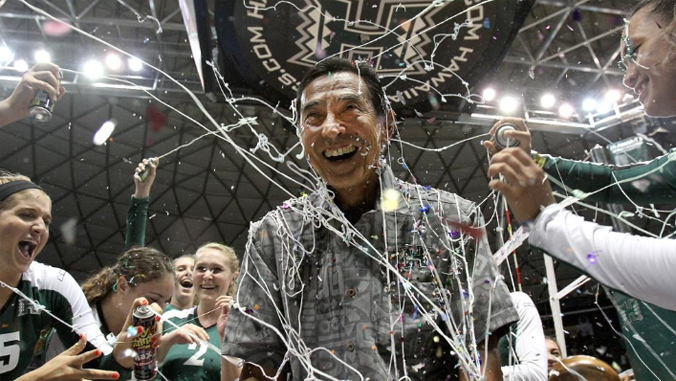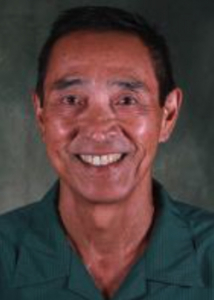
Update: Shoji will be conferred with the honorary doctorate of humane letters degree at the spring UH Mānoa commencement ceremony on May 11, 2024 at 3:30 p.m.
Dave Shoji is a symbol of women’s collegiate volleyball excellence leading the Rainbow Wahine to four national championships during his 41 years as head coach. In recognition of his achievements, the University of Hawaiʻi Board of Regents awarded him with an honorary doctorate of humane letters degree.

“The name Dave Shoji is synonymous with the sport of volleyball, not only in the State of Hawaiʻi but also throughout the country,” said former UH Mānoa Athletics Director David Matlin in a letter submitted in support of the nomination. “And when one talks about Dave Shoji, the University of Hawaiʻi is sure to be mentioned in the same breath.”
Shoji was the head coach of the UH Mānoa women’s volleyball team from 1975 to 2016 and is the second-winningest coach in Division I NCAA volleyball history with 1,202 wins and an .855 winning percentage. He coached 90 All-Americans, five national players of the year and five Olympians and was inducted into the UH Circle of Honor, Hawaiʻi Sports Hall of Fame and American Volleyball Coaches Association Hall of Fame.
Former UH womenʻs volleyball assistant coach and player Kari Ambrozich and longtime sports writer Ann Miller, who reported for the Honolulu Advertiser and Honolulu Star-Advertiser, also submitted letters of support.
“His success could be attributed to a number of personal characteristics, including: his drive, leadership style, work ethic, and knowledge,” wrote Ambrozich. “But he was equally masterful at orchestrating all of the moving pieces of the volleyball program that resulted in highly successful outcomes that evolved over four decades.”
“Beyond what he has accomplished to deserve all the honors he has received, what makes Dave remarkable is simply his impact on Hawaiʻi and his players,” wrote Miller. “No other place comes close to the passion our state has had for the Rainbow Wahine and volleyball the past 40-plus years. It is a part of our lives here.”

